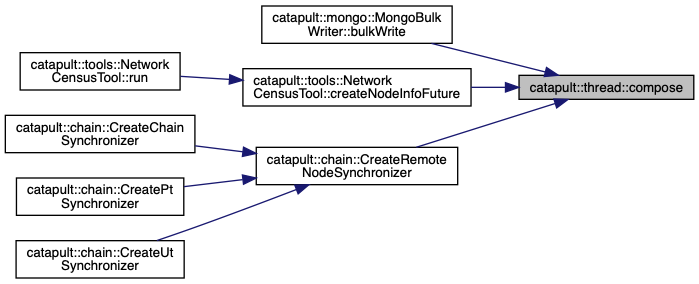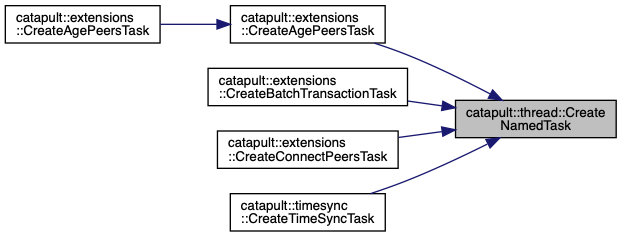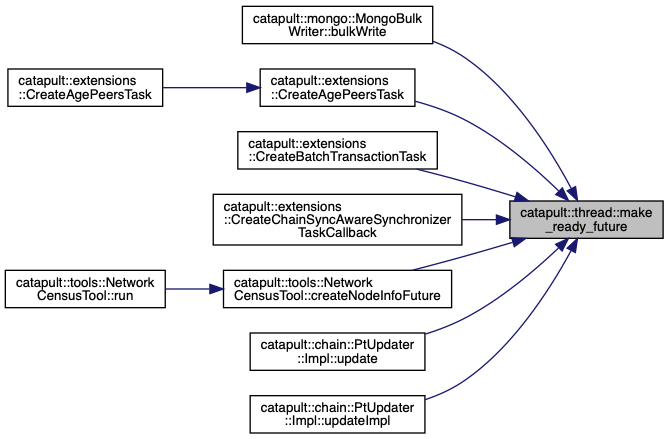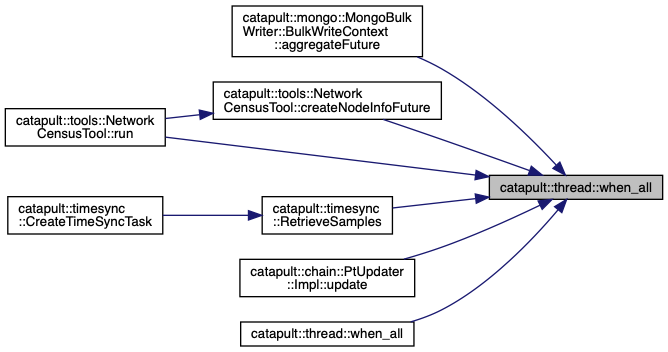Namespaces | |
| detail | |
Classes | |
| class | future |
| Provides a way to access the result of an asynchronous operation. More... | |
| class | IoThreadPool |
| Represents a thread pool that shares a single io context across multiple threads. More... | |
| class | MultiServicePool |
| class | promise |
| Stores the result of an asynchronous operation. More... | |
| class | Scheduler |
| A scheduler. More... | |
| class | StrandedTimedCallback |
| class | StrandOwnerLifetimeExtender |
| Wraps a strand and automatically augments handlers to extend the lifetime of an owning object. More... | |
| struct | Task |
| A task that can be dispatched to the scheduler. More... | |
Typedefs | |
| using | TaskCallback = supplier< thread::future< TaskResult > > |
| Task callback that is invoked by the scheduler. More... | |
| using | DelayGenerator = supplier< utils::TimeSpan > |
| Supplier that generates delays. More... | |
Enumerations | |
| enum | TaskResult { TaskResult::Continue, TaskResult::Break } |
| Result of a task. More... | |
Functions | |
| template<typename T > | |
| future< T > | make_ready_future (T &&value) |
| Produces a future that is ready immediately and holds the given value. More... | |
| template<typename T , typename E > | |
| future< T > | make_exceptional_future (E ex) |
| Produces a future that is ready immediately and holds the given exception (ex). More... | |
| template<typename T > | |
| future< std::vector< future< T > > > | when_all (std::vector< future< T >> &&allFutures) |
| Returns a future that is signaled when all futures in allFutures complete. More... | |
| template<typename T > | |
| future< std::vector< future< T > > > | when_all (future< T > &&future1, future< T > &&future2) |
| Returns a future that is signaled when both future1 and future2 complete. More... | |
| template<typename TSeed , typename TCreateNextFuture , typename TResultFuture = std::invoke_result_t<TCreateNextFuture, future<TSeed>&&>, typename TResultType = decltype(TResultFuture().get())> | |
| auto | compose (future< TSeed > &&startFuture, TCreateNextFuture createNextFuture) |
| template<typename T > | |
| std::vector< T > | get_all_ignore_exceptional (std::vector< future< T >> &&futures) |
| template<typename T > | |
| std::vector< T > | get_all (std::vector< future< T >> &&futures) |
| std::unique_ptr< IoThreadPool > | CreateIoThreadPool (size_t numWorkerThreads, const char *name) |
| template<typename TItems , typename TWorkCallback > | |
| thread::future< bool > | ParallelForPartition (boost::asio::io_context &ioContext, TItems &items, size_t numPartitions, TWorkCallback callback) |
| template<typename TItems , typename TWorkCallback > | |
| thread::future< bool > | ParallelFor (boost::asio::io_context &ioContext, TItems &items, size_t numPartitions, TWorkCallback callback) |
| std::shared_ptr< Scheduler > | CreateScheduler (const std::shared_ptr< IoThreadPool > &pPool) |
| Creates a scheduler around the specified thread pool (pPool). More... | |
| DelayGenerator | CreateUniformDelayGenerator (const utils::TimeSpan &delay) |
| Creates a uniform delay generator that always returns delay. More... | |
| DelayGenerator | CreateIncreasingDelayGenerator (const utils::TimeSpan &minDelay, uint32_t numPhaseOneRounds, const utils::TimeSpan &maxDelay, uint32_t numTransitionRounds) |
| Task | CreateNamedTask (const std::string &name, const TaskCallback &callback) |
| Creates an unscheduled task with name and callback. More... | |
| size_t | GetMaxThreadNameLength () |
| Gets the maximum supported thread name length (excluding NUL-terminator). More... | |
| void | SetThreadName (const std::string &name) |
| std::string | GetThreadName () |
| Gets a thread name in a platform-dependent way. More... | |
| template<typename TCallback , typename... TCallbackArgs> | |
| auto | MakeTimedCallback (boost::asio::io_context &ioContext, TCallback callback, TCallbackArgs &&... timeoutArgs) |
Typedef Documentation
◆ DelayGenerator
| using catapult::thread::DelayGenerator = typedef supplier<utils::TimeSpan> |
Supplier that generates delays.
◆ TaskCallback
| using catapult::thread::TaskCallback = typedef supplier<thread::future<TaskResult> > |
Task callback that is invoked by the scheduler.
Enumeration Type Documentation
◆ TaskResult
|
strong |
Function Documentation
◆ compose()
| auto catapult::thread::compose | ( | future< TSeed > && | startFuture, |
| TCreateNextFuture | createNextFuture | ||
| ) |
Composes a future (startFuture) with a second future returned by a function (createNextFuture) that is passed the original future upon its completion.
- Note
- The future returned by this function will be the same type as the one returned by createNextFuture.

◆ CreateIncreasingDelayGenerator()
| DelayGenerator catapult::thread::CreateIncreasingDelayGenerator | ( | const utils::TimeSpan & | minDelay, |
| uint32_t | numPhaseOneRounds, | ||
| const utils::TimeSpan & | maxDelay, | ||
| uint32_t | numTransitionRounds | ||
| ) |
Creates a three-phase increasing delay generator:
- phase 1: minDelay for numPhaseOneRounds rounds
- phase 2: delay is linearly increased from minDelay to maxDelay over numTransitionRounds rounds
- phase 3: maxDelay for all other rounds

◆ CreateIoThreadPool()
| std::unique_ptr< IoThreadPool > catapult::thread::CreateIoThreadPool | ( | size_t | numWorkerThreads, |
| const char * | name = nullptr |
||
| ) |
Creates an io thread pool with the specified number of threads (numWorkerThreads) and the optional friendly name used in logging.

◆ CreateNamedTask()
| Task catapult::thread::CreateNamedTask | ( | const std::string & | name, |
| const TaskCallback & | callback | ||
| ) |
Creates an unscheduled task with name and callback.

◆ CreateScheduler()
| std::shared_ptr< Scheduler > catapult::thread::CreateScheduler | ( | const std::shared_ptr< IoThreadPool > & | pPool | ) |
Creates a scheduler around the specified thread pool (pPool).
◆ CreateUniformDelayGenerator()
| DelayGenerator catapult::thread::CreateUniformDelayGenerator | ( | const utils::TimeSpan & | delay | ) |
Creates a uniform delay generator that always returns delay.
◆ get_all()
| std::vector<T> catapult::thread::get_all | ( | std::vector< future< T >> && | futures | ) |
Evaluates all futures and returns the results of all.
- Note
- This function will throw if at least one future has an exceptional result.


◆ get_all_ignore_exceptional()
| std::vector<T> catapult::thread::get_all_ignore_exceptional | ( | std::vector< future< T >> && | futures | ) |
Evaluates all futures and returns the results of all non-exceptional ones.
- Note
- Exceptional results are ignored and filtered out.

◆ GetMaxThreadNameLength()
| size_t catapult::thread::GetMaxThreadNameLength | ( | ) |
Gets the maximum supported thread name length (excluding NUL-terminator).

◆ GetThreadName()
| std::string catapult::thread::GetThreadName | ( | ) |
Gets a thread name in a platform-dependent way.

◆ make_exceptional_future()
| future<T> catapult::thread::make_exceptional_future | ( | E | ex | ) |
Produces a future that is ready immediately and holds the given exception (ex).
◆ make_ready_future()
| future<T> catapult::thread::make_ready_future | ( | T && | value | ) |
Produces a future that is ready immediately and holds the given value.

◆ MakeTimedCallback()
| auto catapult::thread::MakeTimedCallback | ( | boost::asio::io_context & | ioContext, |
| TCallback | callback, | ||
| TCallbackArgs &&... | timeoutArgs | ||
| ) |
Wraps callback with a timed callback using ioContext. On a timeout, the callback is invoked with timeoutArgs.

◆ ParallelFor()
| thread::future<bool> catapult::thread::ParallelFor | ( | boost::asio::io_context & | ioContext, |
| TItems & | items, | ||
| size_t | numPartitions, | ||
| TWorkCallback | callback | ||
| ) |
Uses ioContext to process items in numPartitions batches and calls callback for each item. A future is returned that is resolved when all items have been processed.

◆ ParallelForPartition()
| thread::future<bool> catapult::thread::ParallelForPartition | ( | boost::asio::io_context & | ioContext, |
| TItems & | items, | ||
| size_t | numPartitions, | ||
| TWorkCallback | callback | ||
| ) |
Uses ioContext to process items in numPartitions batches and calls callback for each partition. A future is returned that is resolved when all items have been processed.

◆ SetThreadName()
| void catapult::thread::SetThreadName | ( | const std::string & | name | ) |
Sets a thread name in a platform-dependent way.
- Note
- Depending on platform capabilities, the name might be truncated.


◆ when_all() [1/2]
| future<std::vector<future<T> > > catapult::thread::when_all | ( | future< T > && | future1, |
| future< T > && | future2 | ||
| ) |
Returns a future that is signaled when both future1 and future2 complete.



